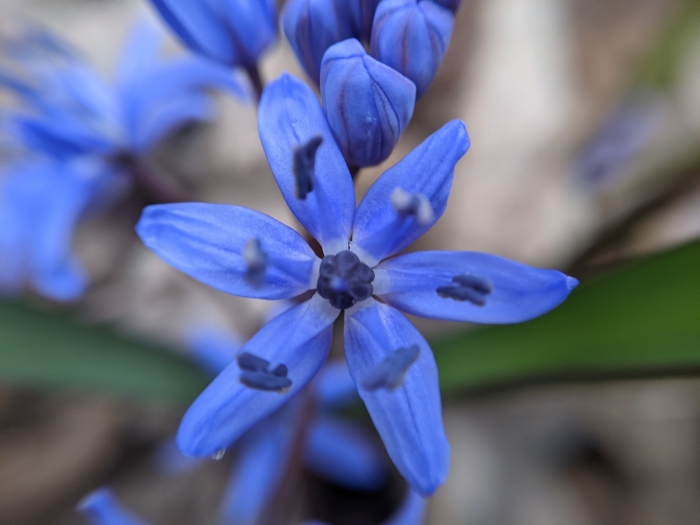Alpine Squill
(Scilla bifolia)
Alpine Squill (Scilla bifolia)
/
/

bemma
CC BY 4.0
Image By:
bemma
Recorded By:
Copyright:
CC BY 4.0
Copyright Notice:
Photo by: bemma | License Type: CC BY 4.0 | License URL: http://creativecommons.org/licenses/by/4.0/ | Rights Holder: bemma | Publisher: iNaturalist | Date Created: 2021-03-04T13:57:09-08:00 |



















































Estimated Native Range
Summary
Scilla bifolia, commonly known as Alpine Squill, is a deciduous perennial bulb native to a variety of habitats including deciduous woodlands, forest edges, and alpine meadows in Europe. It typically grows from a small bulb 1–2 cm (0.4–0.8 in) across. Alpine Squill is notable for its charming, upward-facing flowers that bloom profusely from early to late spring. The flowers consist of six tepals that are most commonly deep violet-blue, although white, pink, or purple varieties can also be found. The plant reaches a modest height of 10-15 cm (4-6 inches), forming clumps that can serve as a carpet of color in the spring.
Alpine Squill is valued for its early spring blooms, which can enliven woodland gardens, rock gardens, and naturalized areas. It is relatively low maintenance, requiring little care once established. It thrives in partial to full shade and prefers moist, well-drained soils rich in organic matter. While it is not typically prone to serious pest or disease problems, it can be susceptible to bulb rot if kept in overly wet conditions. Alpine Squill is not commonly used for culinary or medicinal purposes, but its early flowering makes it a valuable source of nectar for pollinators when few other plants are in bloom. Gardeners should be cautious about planting it outside its native range, as it can become invasive in some regions.CC BY-SA 4.0
Alpine Squill is valued for its early spring blooms, which can enliven woodland gardens, rock gardens, and naturalized areas. It is relatively low maintenance, requiring little care once established. It thrives in partial to full shade and prefers moist, well-drained soils rich in organic matter. While it is not typically prone to serious pest or disease problems, it can be susceptible to bulb rot if kept in overly wet conditions. Alpine Squill is not commonly used for culinary or medicinal purposes, but its early flowering makes it a valuable source of nectar for pollinators when few other plants are in bloom. Gardeners should be cautious about planting it outside its native range, as it can become invasive in some regions.CC BY-SA 4.0
Plant Description
- Plant Type: Bulb
- Height: 0.3-0.5 feet
- Width: 0.3-0.5 feet
- Growth Rate: Moderate
- Flower Color: Blue, Purple
- Flowering Season: Spring
- Leaf Retention: Deciduous
Growth Requirements
- Sun: Full Sun, Part Shade
- Water: Medium
- Drainage: Medium
Common Uses
Bank Stabilization, Bee Garden, Border Plant, Butterfly Garden, Deer Resistant, Fragrant, Groundcover, Low Maintenance, Rabbit Resistant, Rock Garden, Showy Flowers
Natural Habitat
native to a variety of habitats including deciduous woodlands, forest edges, and alpine meadows in Europe
Other Names
Common Names: Two-Leaf Squill, Squillia, Tobladet Skilla, Scille À Deux Feuilles, Vroege Sterhyacint, Tidig Blåstjärna
Scientific Names: , Scilla bifolia, Scilla rosea, Adenoscilla bifolia, Scilla drunensis, Scilla lusitanica, Scilla bifolia subsp. bifolia, Scilla spetana, Scilla decidua, Scilla bifolia subsp. praecox
GBIF Accepted Name: Scilla bifolia L.